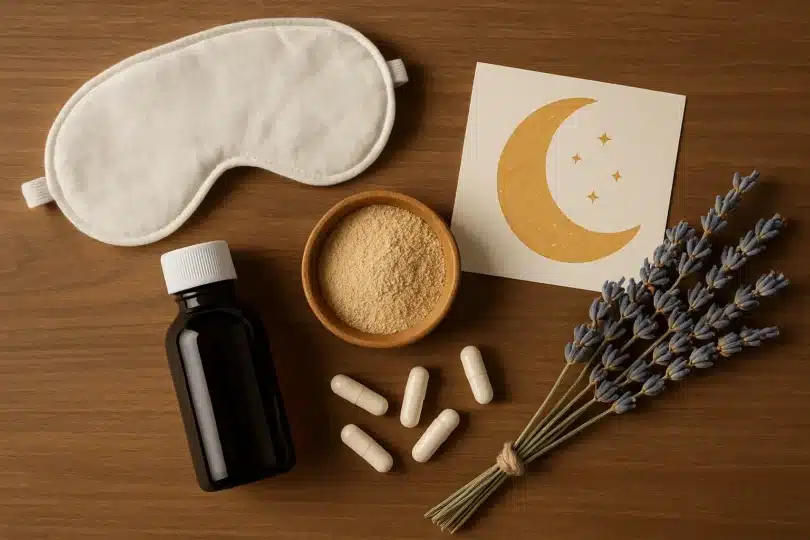For countless adults, the biggest challenge with sleep isn’t staying asleep—it’s falling asleep in the first place. Racing thoughts, digital distractions, late-night snacks, or even irregular schedules can all interfere with the body’s natural transition into rest. While supplements and remedies can support healthy sleep, lifestyle plays just as big a role. Establishing the right evening routine is one of the most powerful, drug-free strategies for reducing sleep latency (the time it takes to fall asleep). In this article, we’ll explore the science of winding down, practical routines that work, and how to combine them with natural aids for the best results.
Why Evening Routines Matter
Sleep is heavily regulated by the circadian rhythm, an internal 24-hour clock influenced by light, food, and behavior. Evening routines signal to the brain that it’s time to shift from daytime alertness into nighttime recovery. Without these cues, the body may continue producing stress hormones like cortisol, delaying melatonin release and making it harder to drift off. Consistent habits act as “anchors” for the circadian rhythm, improving both the speed of falling asleep and overall sleep quality.
Key Elements of an Effective Evening Routine
1. Light Management
Artificial light—especially blue light from screens—delays melatonin release. Turning off devices or using blue-light filters at least one hour before bed can significantly shorten sleep latency. Dim, warm lighting in the evening mimics the natural sunset and helps the brain prepare for rest.
2. Consistent Bedtime
Going to bed and waking up at the same time each day stabilizes the circadian rhythm. Even small variations, like staying up late on weekends, can create a “social jet lag” effect that disrupts the week ahead. A predictable schedule trains the body to expect sleep at the same hour, making it easier to fall asleep quickly.
3. Relaxation Rituals
Activities that activate the parasympathetic nervous system (the “rest and digest” system) can accelerate the wind-down process. Reading a physical book, gentle stretching, yoga, meditation, journaling, or listening to calming music are all effective. Over time, these rituals become psychological signals that it’s time to sleep.
4. Evening Nutrition
Heavy meals, caffeine, and alcohol late in the evening can disrupt both falling asleep and staying asleep. Instead, light snacks containing tryptophan (such as yogurt, almonds, or a banana) may support melatonin production. Herbal teas like chamomile, valerian, or lemon balm offer a calming effect without stimulating the body.
5. Bedroom Environment
The sleep environment is just as important as what you do before bed. A cool, dark, and quiet bedroom promotes faster sleep onset. Blackout curtains, white noise machines, and comfortable bedding can reduce environmental disturbances that delay sleep.
Natural Remedies That Complement Evening Routines
For some, routines alone may not be enough. Combining habits with natural supplements can enhance the body’s readiness for sleep:
- Magnesium glycinate — promotes muscle relaxation and reduces nighttime restlessness.
- Ashwagandha — lowers stress and cortisol, easing transitions into rest.
- L-theanine — reduces mental chatter, supporting calm focus and quicker sleep onset.
- CBD oil — modulates stress and circadian balance, particularly useful for anxiety-driven insomnia.
- Chamomile tea — provides a gentle, traditional calming ritual that works synergistically with bedtime habits.
Risks and Common Mistakes
Not all habits marketed as “bedtime-friendly” are effective. Scrolling social media or watching TV in bed often prolongs wakefulness. Over-reliance on melatonin, especially in high doses, may disrupt natural rhythms. Drinking alcohol may help people fall asleep faster but often fragments sleep cycles, leaving them less rested. Even healthy activities like intense late-night workouts can delay sleep due to elevated body temperature and adrenaline. The key is balance—choosing calming, non-stimulating habits and pairing them with consistency.
Building Your Own Routine
Creating an evening routine doesn’t require a complete lifestyle overhaul. Start with small, sustainable changes:
- Pick a consistent bedtime and stick to it, even on weekends.
- Turn off screens one hour before bed and replace them with a relaxing ritual like tea or journaling.
- Use dim lighting to mimic natural sunset cues.
- Keep the bedroom cool, dark, and quiet.
- If needed, layer in a natural supplement such as magnesium or chamomile tea.
Over time, these steps condition both the mind and body to associate nighttime with rest, reducing the need to “force” sleep.
Closing
Evening routines are the foundation of better sleep. They work by training the brain and body to recognize predictable signals that it’s time to rest. From dimming lights to sipping calming teas, each habit contributes to faster sleep onset and deeper rest. While supplements like magnesium, ashwagandha, and CBD can provide added support, the consistency of lifestyle routines remains the most powerful tool. In 2025, with sleep challenges on the rise, investing in evening habits is one of the simplest and most effective ways to improve health, mood, and resilience.

